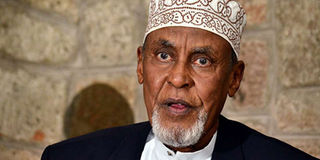The unclear route to the BBI report

Building Bridges Initiative Task Force Chairperson Yusuf Haji briefs media about the status of their report, on November 22, 2019 at Intercontinental Hotel. The document will be launched at Bomas of Kenya. PHOTO | FILE | NATION MEDIA GROUP
What you need to know:
- The journey has deeper symbolism that has to do with Kenya’s cycle of violent elections that goes beyond the handshake.
- Although a lot of attention had been given to institutional reforms to improve things, little has been achieved.
The road leading to the release of the Building Bridges Initiative (BBI) report has been confusing, since it is not clear exactly how it started.
On paper, it began on March 9, 2018, with a rumour that President Uhuru Kenyatta and ODM leader Raila Odinga, the main protagonists in the 2013 and 2017 presidential elections, were meeting at the Office of the President in Harambee House, Nairobi.
Before long, the two, whose struggle for power brought the country to the brink of an ethnic conflagration, emerged on the steps of the building and addressed an unbelieving nation, followed with their now famous handshake.
“The ties that bind us are today under the severest stress. Our diversity appears destined to be a curse to ourselves today and to our children tomorrow,” they said in a joint statement.
CHAOTIC POLLS
But in reality, the journey that ends with the handing over of the report Wednesday has deeper symbolism that has to do with Kenya’s cycle of violent elections that goes beyond the handshake.
“We got here because of the history of Kenya’s divisive elections,” National Assembly Minority Whip Junet Mohamed told the Nation on Monday
“BBI will be the biggest thing in the history of our country after independence. We hope it will unite the country once and for all because it is not about politics or who will be the next President,” Mr Mohamed said.
Although a lot of attention had been given to institutional reforms to improve things, little has been achieved.
The 2017 elections were held in atmosphere of suspicion, making for highly contentious results.
ELECTION LAWS
The Opposition and civil society had issues with various sections of the electoral laws, the procurement of election materials and even the recruitment of election officials.
Then, on the eve of the repeat of presidential election on October 26, the High Court nullified the recruitment of all the 290 returning officers and their deputies, saying their recruitment was unprocedural.
When the Supreme Court nullified the result of the first presidential election on August 8, it only added to an already tense political atmosphere, with pro-government politicians training their guns on Chief Justice David Maraga and his colleagues.
In between the two elections, Parliament had, in a partisan move, amended the election laws, adding confusion to the management of the repeat poll.
Mr Odinga pulled out of the race and asked his supporters to stay away.




